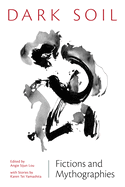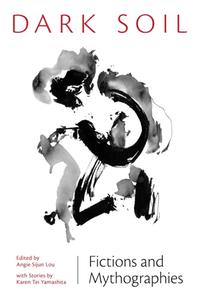
 A stunning blend of "history, biography, geography, and mythmaking," Dark Soil: Fictions and Mythographies is a complex, experimental anthology that encourages readers to consider their relationships to space anew, through both uncovering and reimagining. Curated and edited by Angie Sijun Lou, the book presents 10 short stories by National Book Award finalist Karen Tei Yamashita (I Hotel), followed by pieces from eight other writers that include essays and lyric poetry.
A stunning blend of "history, biography, geography, and mythmaking," Dark Soil: Fictions and Mythographies is a complex, experimental anthology that encourages readers to consider their relationships to space anew, through both uncovering and reimagining. Curated and edited by Angie Sijun Lou, the book presents 10 short stories by National Book Award finalist Karen Tei Yamashita (I Hotel), followed by pieces from eight other writers that include essays and lyric poetry.
Yamashita's tales, collected in the first part of the book under the title "Santa Cruz Nori," explore hidden landmarks of Santa Cruz, Calif. They are fictions rooted in reality that the author uses to "animate and reconstruct liminal histories," such as time traveling to a Spanish mission and giving voice to both the oppression inflicted upon the people there and how they responded to this oppression. These stories bear witness to obscured versions of the same place, seen through the eyes of people often marginalized or objectified by history, as in the production of a "A Midsummer Night's Dream" starring Ursula K. Le Guin and Ishi, the last known member of the Yahi people.
Yamashita's work is dotted throughout with photographs and "walking tour" directions to the locations highlighted by each story. She allows her characters to reclaim spaces they may have been erased from, such as in "Neverneverland," where two women across generations must deal with the monstrous secret hidden behind the walls of a retirement home near the Santa Cruz Pier. The fictions at times border on the surreal or the fantastical, but in doing so, cast a different light on places people think they know well.
The curated essays and other works in the second part of the collection echo and mirror this process, with each author diving deep into a particular space that they felt especially connected to, as Saretta Morgan does with the Buenos Aires National Wildlife Refuge in Arizona. Likewise, Juliana Spahr's coursing verse "The Blue Plume" considers the Ohio River and who it belongs to--versus who belongs to it. These pieces urge readers to reexamine their relationships to places, to history, to how humans document or consider what qualities about a space serves its ongoing importance. As a result, Lou's unifying goal shines through: Dark Soil serves as "a field guide for understanding our future and its terrain of struggle" that ultimately reconfigures how readers might see themselves in the contexts of the places they pass through. --Michelle Anya Anjirbag, freelance reviewer
Shelf Talker: A stunning anthology uses the strength of story, both fiction and nonfiction, to address missing histories and revive the narratives that have too often been omitted.

